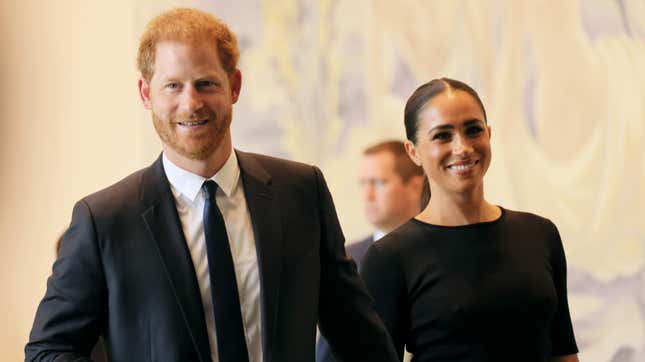
In the second episode of Meghan Markle’s new podcast Archetypes, “The Duality of the Diva,” she and featured guest Mariah Carey discuss the complexities and negative connotations associated with having that label. But it was the conversation about both of their mixed race or biracial identities that got most of the internet talking on Tuesday.
Per People, the two discussed the in-between space of not fitting in growing up and not being treated as a Black woman or a white woman due to their identities. Meghan revealed that it was women like Mariah and later, Halle Berry, who made her feel seen and represented.
“You were so formative for me. Representation matters so much,” she said of Mariah. “But when you are a woman and you don’t see a woman who looks like you somewhere in a position of power or influence, or even just on the screen—because we know how influential media is—you came onto the scene, I was like ‘Oh, my gosh. Someone kind of looks like me.”
Of not existing in that in-between space, Meghan later divulged that it wasn’t until she married Prince Harry that she finally understood “what it was like being treated as a Black woman.”
“I think for us, it’s very different because we’re light-skinned,” she explained. “You’re not treated as a Black woman. You’re not treated as a white woman. You sort of fit in-between.”
She later added, “If there’s any time in my life that it’s been more focused on my race, it’s only once I started dating my husband. Then I started to understand what it was like to be treated like a Black woman. Because up until then, I had been treated like a mixed woman. And things really shifted.”
What I find commendable about Meghan’s latter point is that while the realization of what it’s like to be “treated like a Black woman” came later in life for her, and was obviously in stark contrast to the presumably “better” treatment she’d been experiencing most of her life, her admission of this fact doesn’t come across as self-pitying or pitying to Black women who more immediately and/or more clearly identify and occupy in that space.
If you’ve lived almost your entire life being perceived as one thing by one group of people, and then suddenly find yourself catapulted into a different group where they view you as something else entirely (even if it’s been a part of your identity all along), it’s understandable for there to be some disconcerting and disconnecting feelings.
Perhaps more positively, that realization didn’t cloud the Duchess’ understanding of the magnitude of her marriage to Prince Harry when it came to representation for Black folks around the world. In fact, in a her recent interview with The Cut, she revealed a particular conversation she had with a South African actor who told her how proud and celebratory of her nuptials.
From The Cut:
Even though she avoids reading her own press, Meghan knows people see her this way. She recalls a moment from the 2019 London premiere of the live-action version of The Lion King. “I just had Archie. It was such a cruel chapter. I was scared to go out.” A cast member from South Africa pulled her aside. “He looked at me, and he’s just like light. He said, ‘I just need you to know: When you married into this family, we rejoiced in the streets the same we did when Mandela was freed from prison.’ ” Of course, she knows she’s no Mandela, but perhaps even telling me this story is a mode of defense, because if you are a symbol for all that is good and charitable, how can anybody find you objectionable, how can anybody hate you?
In response, Nelson Mandela’s grandson Zwelivelile ‘Mandla’ Mandela, commented on Meghan’s remarks explaining that he thought her comments were “surprising”: “Madiba’s celebration was based on overcoming 350 years of colonialism with 60 years of a brutal apartheid regime in South Africa,” he said per Newsweek. “So It cannot be equated to as the same.”

